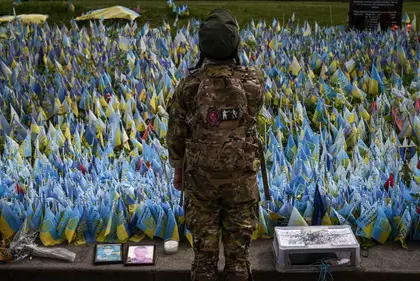Ukraine’s counter-offensive has not swept the Russian occupiers from Ukrainian territory, but it has made some things clear.
First: There is a growing dissonance between the broad, international acceptance of Ukraine’s terms for a “just peace” and the understanding of how they can be delivered.
JOIN US ON TELEGRAM
Follow our coverage of the war on the @Kyivpost_official.
The counter-offensive has emphasized the limited resources Ukraine has to achieve its declared objectives militarily, so what happens on the battlefield should not be regarded as the predominant factor in attaining a just peace. On the contrary, international diplomatic and sanctions pressure should be seen as key to ending the war.
Putin’s Russia has evolved into an existential threat to the international community and it would be unfair to load Ukraine with the burden of bringing it down, even if Kyiv did have all the resources to do so.
Second: The counter-offensive was not adequately prepared nor equipped. Much has been written about the absence of F-16 combat aircraft as a factor impeding success, yet a lot of other equipment was needed, including mine-clearing machines, heavy tanks, long-distance missile systems, and artillery shells.
The relative success of the counter-offensive has demonstrated the motivation and commitment of the Ukrainians who have managed — and continue — to break through Russian lines. But mathematics and military science show an obvious need to supply Ukraine with the equipment necessary to achieve military success. Without it, the campaign will waste the lives of still more Ukrainian soldiers, and 200,000 are already either dead or seriously wounded.

Trump Makes 90 Day Foreign Aid Freeze – Ukraine Military Support Supposedly Untouched
Third: The Russians did not run away from Ukrainian territory, and there was no collapse of the frontline. In this connection, there are already voices discussing the next Ukrainian counter-offensive in the winter and spring. A high-ranking Western official was recently quoted saying there could be seven more years of war. If it does continue for so long, as a war of attrition on Ukrainian territory, the country will be completely destroyed.
What is clear is that Ukrainians have no choice but to fight, as it is a war of genocide. Russia’s stated policy is to destroy Ukraine as a nation, either by smashing its identity or killing everybody who remains loyal to that identity.
The only choice is whether my nation should die on its feet or on its knees. It is cynical to suggest Ukraine should stop military action and start negotiations. As has been emphasized many times, the surrender of Ukrainian territory will not stop Russian aggression but will raise Russia’s appetite for a pause followed by further military action.
Fourth: There are two options that may positively transform the counter-offensive: a qualitative leap in NATO’s involvement, through more and better weapons in war-winning numbers, and intensified pressure on Russia through diplomacy and sanctions (the so-called oil price cap on Russian crude is now openly failing, for example, and yet the G7 is refusing to take any corrective action.)
Should these steps be taken simultaneously, there is some chance that Russia will either step back and withdraw from Ukraine or be defeated. In this case, NATO’s follow-up in the peace negotiations is vital, to restore peace in Europe and re-establish the European security system, reasserting the old yet still relevant slogan “Never again!”
Oleksandr Moskalenko is an academic researcher focusing on European politics. He is an In-resident Fellow at the Center for European Policy Analysis (CEPA, Washington, DC). He has a Ph.D. in European Law and previously lived in the Ukrainian city of Kharkiv.
This article was first published by CEPA on Sep. 28, 2023. Read the original here.
The views expressed are the author’s and not necessarily of Kyiv Post.
You can also highlight the text and press Ctrl + Enter










